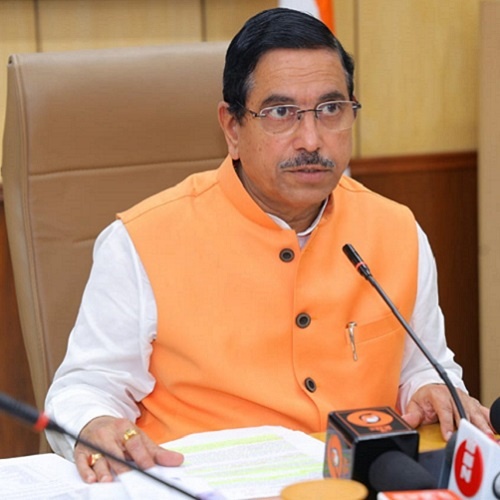The Eighth Session of the International Solar Alliance (ISA) Assembly, set to take place from October 27 to 30, 2025, at Bharat Mandapam in New Delhi, aims to unite the world under the banner of One Sun, One Vision, One Shared Commitment to solar energy.
Launched by India and France at COP21 in Paris, ISA has become the largest treaty-based intergovernmental organization from the Global South, bringing together 124 Member and Signatory Countries. This high-level ministerial event comes just weeks before COP30 in Brazil and is expected to help shape global priorities for scaling up solar energy, unlocking transformative finance, establishing technology and policy roadmaps, and fostering skill ecosystems that accelerate an inclusive energy transition.
During a curtain-raiser event, Shri Pralhad Joshi, Minister of New and Renewable Energy and President of the ISA Assembly, highlighted India’s success in renewable energy. He noted that India achieved its renewable energy targets five years ahead of schedule, surpassing 50% of its overall installed electricity capacity from non-fossil resources. With approximately 125 GW of solar capacity, India has become the third-largest solar producer in the world. He emphasized how India’s renewable energy efforts have improved lives on the ground, providing decentralized solar power to rural homes, local health centers, and farms. More than 20 lakh households have benefited from solar power under the PM Surya Ghar – Muft Bijli Yojana.
Joshi further discussed the PM-KUSUM scheme, which is transforming India’s rural heartland. The scheme aims to install 10 gigawatts of small solar plants, support 1.4 million off-grid solar pumps, and solarize 3.5 million grid-connected agricultural pumps. “These initiatives ensure that clean energy reaches the last mile, combining scale with inclusiveness to define India’s energy transition,” he said.
Shri Santosh Kumar Sarangi, Secretary of the Ministry of New and Renewable Energy, added that India is now the third-largest in solar power and the fourth-largest in wind power, while also becoming the third-largest renewable energy installer globally. He also highlighted India’s leadership in solar module manufacturing, ranking second globally after China, and its expanding role in green hydrogen production. India is on track to produce 5 million tonnes of green hydrogen by 2031, a critical element of the country’s energy security.
Sarangi praised ISA’s role in facilitating cross-learning and solar deployment at both large and distributed scales, particularly in countries across Africa. He emphasized that India is eager to share its experience in deploying solar energy through initiatives like the PM Surya Ghar – Muft Bijli Yojana and the PM-KUSUM scheme with other nations.
Mr. Ashish Khanna, Director General of ISA, pointed out that global renewable energy is at a pivotal moment. “Renewables have doubled their growth in just two years, surpassing fossil generation for the first time,” he said. He noted that the coming decade must focus not just on ambition but on tangible action. ISA, according to Khanna, is positioned as a key platform for collective action to accelerate solar deployment worldwide. He emphasized that the focus must now shift from commitments to actual projects, from discussions to implementation, and from potential to measurable impact.
Reflecting on Prime Minister Narendra Modi’s vision at the first ISA Assembly in 2018, Khanna stressed ISA’s role in advancing solar deployment, harmonizing technology standards, enabling data-driven energy planning, supporting innovation, and promoting the One Sun, One World, One Grid (OSOWOG) initiative. He also highlighted India’s potential to become the “Silicon Valley for Solar” through the establishment of the Global Capability Centre (GCC), which is linked with STAR-C hubs worldwide for technical support, digital tools, and training.
The Eighth Session of the ISA Assembly will focus on four strategic pillars: Catalytic Finance Hub, Global Capability Centre & Digitisation, Regional & Country-Level Engagement, and Technology Roadmap & Policy. Ministerial and technical sessions will explore key priorities, including advancing finance through the Africa Solar Facility, strengthening country partnerships with the Small Island Developing States (SIDS) Platform, and scaling innovations in floating solar, AI, digitisation, OSOWOG, green hydrogen, and solar energy for agriculture.
The Assembly will also feature the release of ISA’s flagship reports: Ease of Doing Solar 2025 and Solar Trends 2025, which will outline global progress and strategies for scaling solar deployment.
Ahead of the Assembly, ISA convened regional meetings across its four regions: Europe & Others (Brussels, June 10-12), Asia-Pacific (Colombo, July 15-17), Latin America & the Caribbean (Santiago, August 4-6), and Africa (Accra, September 2-4). These meetings, attended by representatives from over 100 countries, discussed progress, addressed challenges, and aligned regional initiatives with ISA’s global objectives. Recommendations on finance, innovation partnerships, and solar energy access will be incorporated into the Assembly’s deliberations.















